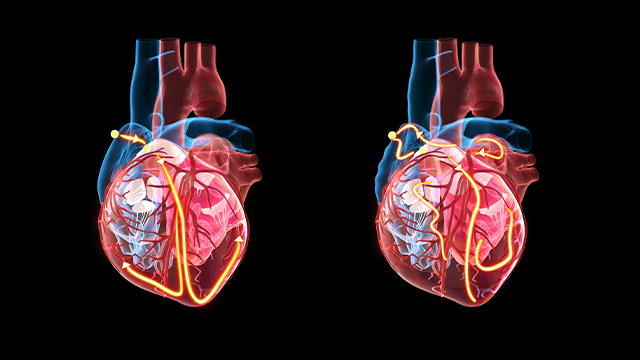Supplemental VENUS Trial Study Demonstrates Better Results in Hard-to-Treat AFib
May 10, 2021 - Todd AckermanAdding a shot of alcohol to a small vein in the heart's upper left chamber during catheter ablation to treat atrial fibrillation works best when the therapy targets an area where an abundance of electrical activity can cause an abnormally fast rhythm, according to new Houston Methodist research.
In a recent paper published in the journal Heart Rhythm and a poster to be presented at the American College of Cardiology conference in mid-May, Dr. Adi Lador found that infusing ethanol in atrial fibrillation patients' vein of Marshall (VOM) was most beneficial when the surgeon also systemically ablated a nearby atrial flutter, another type of arrhythmia. The flutter, around the mitral valve that separates the heart's left upper and lower chambers, is common in patients with persistent atrial fibrillation.
"Our conclusion is that if you are injecting ethanol in the VOM, you should also ablate the atrial flutter spinning around the mitral valve," said Dr. Lador, a Houston Methodist cardiac electrophysiology fellow and the paper's first author. "Then you will have significantly better outcomes."
Dr. Lador noted the study found such outcomes were better at centers that perform a high volume of ablation procedures. She attributed that to the mix of skills needed in both interventional cardiology and electrophysiology.
The research is Dr. Lador's sub-analysis of a study led by Houston Methodist electrophysiologist Dr. Miguel Valderrábano, published in the Oct. 2020 Journal of the American Medical Association. The study found targeting the vein of Marshall with ethanol during ablation increased the chance of maintaining normal rhythm in hard-to-treat atrial fibrillation compared to those who received ablation but not the ethanol infusion.
What is atrial fibrillation (AFib)?
Atrial fibrillation, or AFib, is an abnormal and irregular heart rhythm that can lead to stroke, blood clots and heart failure if not treated. Its prevalence in the U.S. ranges from 2.7 million to 6.1 million, according to the Centers for Disease Control and Prevention.
Catheter ablation, which uses heat to create tiny scars in the heart to block abnormal electrical signals and restore a normal rhythm, is considered standard treatment for the condition. But while it is effective for some, in many patients the procedure must be repeated multiple times to achieve positive results.
Ethanol infusion was an early mode of ablative treatment for cardiac arrhythmia, but was largely superseded by radiofrequency ablation. However, researchers have recently begun exploring such infusions through different cardiac veins, such as VOM, as an add-on strategy.
Can catheter ablation with ethanol normalize a too-fast heart rate?
In the trial led by Dr. Valderrábano, researchers found 49% of AFib patients who received catheter ablation and ethanol through the VOM remained free of the condition at the six- and 12-month mark, compared to 38% of patients who receive ablation alone. The trial, known as VENUS, or Vein of Marshall Ethanol for Untreated Persistent Atrial Fibrillation, enrolled 343 patients at 12 U.S. centers, including Houston Methodist.
In the new study, Dr. Lador drilled deeper into the VENUS trial results to identify subgroups that might benefit the most. She found the greatest benefit in those patients in whom surgeons ablated the "peri-mitral flutter," where electricity spins around the mitral valve and can cause the heart to beat in a regular but too-fast rate. Ablating the flutter blocks the electricity and breaks the circuit.
Dr. Lador's analysis found that nearly 59% of VENUS trial patients receiving such treatment at high-volume centers sustained normal heart rhythms. In comparison, 39% of those AFib patients who did not receive the additional treatment sustained normal heart rhythms.
The approach improved outcomes for both atrial fibrillation and atrial flutter, noted Dr. Lador.
Dr. Lador added that the analysis showed the need for follow-up study.


